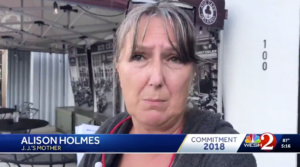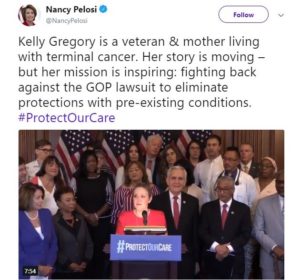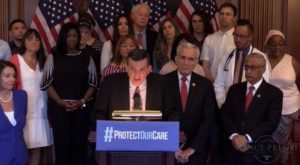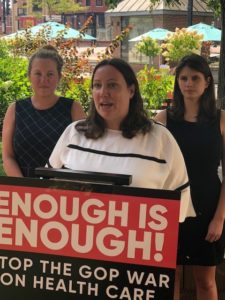“This bill is the latest swing the of the sledgehammer the GOP has taken to our health care,” says Brad Woodhouse
Washington, DC – The House of Representatives is expected to vote on a health care repeal bill (HR 3798) this week that would slash coverage for up to one million people and cost taxpayers more than $50 billion. The proposed bill would increase the number of hours needed to qualify as a full-time employee from 30 hours a week to 40 hours a week and is projected to cost $51.6 billion over the next decade, resulting in one million people losing their employer-based coverage, and making employers more likely to shift toward part-time work.
Statement from Brad Woodhouse, executive director of Protect Our Care:
“From the Vice President on down, Republicans have pledged that if they retain their majorities in November, they will be coming for our health care and work overtime to repeal it. Only thing is, they aren’t waiting til November to repeal our health care and, as this bill shows, they’re even coming after employer-based health insurance coverage. By allowing employers to kick their full-time workers off of coverage, this bill is only the latest swing of the sledgehammer the GOP has taken to our health care, resulting in higher costs for all of us.”
This bill represents yet another way that Republicans are trying to make it harder for Americans to access health coverage.
If passed, it is estimated that this change could strip health care from up to one million people, result in cuts to hours worked and increase health care costs. Here’s how:
The Congressional Budget Office Estimates That This Change Would Cause One Million People To Lose Their Employer-Based Coverage. In 2014, when the Congressional Budget Office (CBO) last estimated the impact of raising the number of hours worked to qualify as a full-time employee from 30 hours to 40 hours a week, it found such a change would reduce the number of people receiving employer-sponsored care by about one million. [Congressional Budget Office, 2/25/14]
The Congressional Budget Office Estimates That This Change and Other Provisions in The House Bill Implementing Change Would Cost $51.6 Billion Over the Next Decade. The nonpartisan Congressional Budget Office has estimated that changes to the ACA’s employer mandate will cost the federal government $51.6 billion over the next decade.[Congressional Budget Office, 9/11/18]
Center On Budget And Policy Priorities Warns Change Would Put More Workers At Risk Of Having Hours Reduced. In 2015, when the House considered raising the number of hours required to count as a full-time employee from 30 hours per week to 40 hours per week, the Center on Budget and Policy Priorities warned against this measure, saying: “Raising the law’s threshold from 30 hours a week to 40 hours would make a shift toward part-time employment much more likely — not less so. That’s because only a small share of workers today — 7 percent — work 30 to 34 hours a week and thus are most at risk of having their hours cut below health reform’s threshold. In comparison, 44 percent of employees work 40 hours a week, and another several percent work 41 to 44 hours a week. Thus, raising the threshold to 40 hours would place many more workers at risk of having their hours reduced.” [Center On Budget And Policy Priorities, 1/6/15]
Commonwealth Fund: Raising The Threshold Would Also Raise The Costs Of Federal Health Reform. “Raising the threshold would also raise the federal costs of health reform. As the full-time threshold rises, so does the number of uninsured workers eligible for coverage on the Affordable Care Act’s health insurance marketplaces, or exchanges… Even without employer changes to work schedules, over 500,000 more workers employed between 30 and 40 hours a week could qualify for exchange subsidies at a threshold of 40 hours rather than at the current 30-hour threshold.” [Commonwealth Fund, 1/24/14]
This bill is the latest in a long line of attacks on health care the GOP has launched since assuming power.
- The Trump Administration’s Department of Justice has joined twenty conservative states in court to argue that the Affordable Care Act’s protections for people with pre-existing conditions should be overturned.
- In August, Trump Administration finalized a rule to expand access to bare-bones junk plans that are exempt from key consumer protections, such as the requirement that insurance covers prescription drugs, maternity care, and hospitalization.
- This summer, the Trump Administration slashed funding for non-profit health navigator groups, that help people shop for coverage, from $36 million to $10 million. CMS encourages groups to use the remaining funds to push people to sign up for junk plans that skirt important consumer protections. These cuts come on top of a 40 percent cut last year, which reduced funding from $62.5 million to $36 million.
- In June, the Trump Administration finalized yet another proposal, an association health plan rule, designed to lure consumers away from comprehensive coverage and toward plans that skirt key consumer protections.
- In May, House Republicans voted on a budget amendment that would cut Medicare by $239 billion and Medicaid by $700 billion over ten years, $114 billion in a single year alone.
- In January, the Trump Administration announced that it would support states that impose onerous work requirements on Americans covered by Medicaid, and approved Kentucky’s worst-in-the-nation waiver the next day.
- In December 2017, Congressional Republicans passed their tax scam, which doubled as a sneaky repeal of the Affordable Care Act by kicking 13 million people off of their insurance and raising premiums by double digits for millions more.
- In August 2017, the Administration cut the outreach advertising budget for Open Enrollment by 90 percent, from $100 million to just $10 million – which resulted in as many as 1.1 million fewer people getting covered.
- In July 2017, the Trump Administration used funding intended to support health insurance enrollment to launch a multimedia propaganda campaign against the Affordable Care Act.
- Last summer, Republicans attempted to repeal the Affordable Care Act numerous times. In May, House Republicans voted for and passed a health care repeal bill that would cause 23 million people to lose coverage and gut protections for people with pre-existing conditions. Senate Republicans tried and failed to pass BCRA, Skinny Repeal and Graham-Cassidy, all repeal bills that would have caused millions of Americans to lose their health coverage and raised premiums by double digits for millions more.
- In April 2017, the Trump Administration cuts the number of days people could sign up for coverage during open enrollment by half, from 90 days to 45 days.









